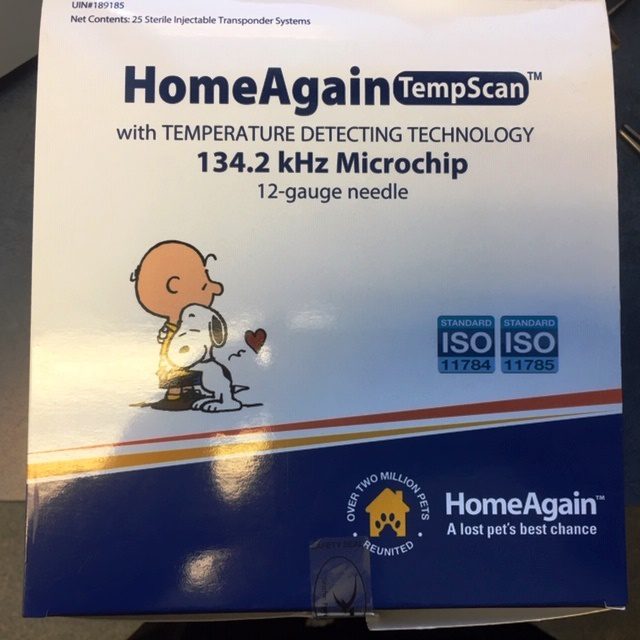
One of our veterinary assistants recently shared a story with us about a clinic in California where she worked. Someone had found a stray cat and brought it in. The clinic scanned for a microchip, which was there, and got the information needed to contact the owner. After explaining why they were calling, there was a long pause.
The cat, the owner said, had been missing for almost five years.
Surprisingly, stories such as this aren’t uncommon—although five years could be considered very unusual! A few years ago we had a cat brought to us and were able to reunite him with his owner after having been missing for almost six months. (If you enjoy reading about such reunions, check out these other amazing “found pet stories”.)
Make sure your pet’s ID is up-to-date
Which brings us to National Pet ID Week, recognized each year for seven days beginning on April 17th.
This week is set aside to remind pet owners to check or double-check their pet’s identification. All pets should have ID tags which they wear at all times, and which should have at a minimum your phone number included.
Other suggested ID tag information to include is the pet’s name, your address, and whether he’s microchipped (“I’m microchipped!”). Naturally there are space considerations, and people have their own reasons for including or omitting information. Generally speaking, though, more information leads to better chances for getting the pet home.
Custom tags can be purchased in a variety of places, including specialized vending machines in many pet stores.
Even if you’ve made sure that your pet’s ID tags are legible and have the current info, the tags can still be lost. They can snap off of the collar, or the animal may slip out of the collar entirely. Fortunately, that’s where something more permanent comes in: the microchip.
The importance of microchipping
The Ann Arbor Animal Hospital uses microchips from HomeAgain. This small chip (about the size of a grain of rice) acts as a pet’s permanent identification. Note that this is not a GPS chip so it will not show the animal’s location.
During implantation, one of our veterinarians injects the microchip underneath the pet’s skin, usually between the shoulder blades. For the animal, the process is much like getting a vaccination. This chip is permanent and can’t be removed or become unreadable. If the pet is ever lost and ends up at a veterinarian or shelter, the information in the chip is used to contact pet’s owner so they can be reunited.
Microchipping can be even more important in an emergency situation. The Ann Arbor Animal Hospital Emergency Service has had Good Samaritans bring in injured pets, even though they aren’t the animal’s owner. The pet having a microchip in this instance is invaluable. It allows us to contact the pet’s owner and let them know not only that we have their pet, but also the status of his health and what needs to be done to help him.
Don’t skip the annual exam
We encourage our clients to consider having a microchip implanted when visiting for their pet’s annual fecal test, heart worm test, vaccinations, and overall health check-up. If your pet already has one, we can scan to make sure it’s still in the right place and working properly, and that your contact info is up-to-date.
Having a pet go missing can be a traumatic or heartbreaking experience. It’s estimated that a third of pets will get lost or go missing some time in their lives. Help to make sure that your loved one gets home. Check your pet’s tags right now, and if you haven’t already, consider getting them microchipped. We all want to see more happy reunions!

Recent Posts
About Us
Ann Arbor Animal Hospital is a locally-owned animal hospital operating for over 90 years in Ann Arbor, MI.


